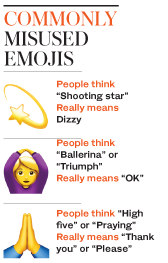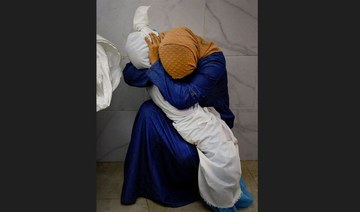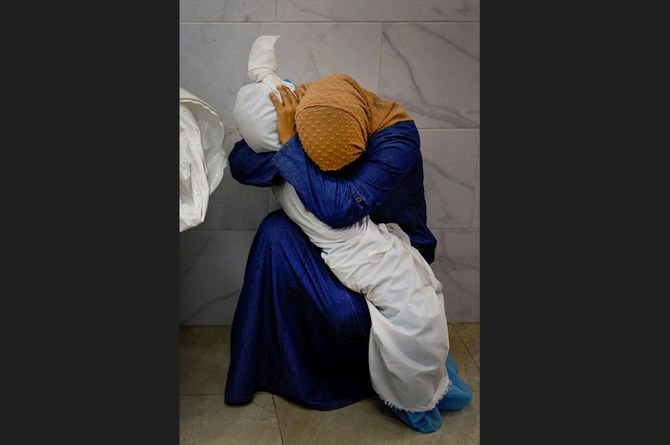DUBAI: What started as a Japanese invention has taken the world by storm, including in the Middle East where the use of emojis, a modern picture-based form, often features in online and phone texts.
Today is World Emoji Day, marking the rapidly evolving system that some suggest is a “major throwback” to primitive picture-based communication forms.
And the use of emojis in the Middle East has shown how these simple images help to cross language barriers — there’s little confusion over the smiley face, although the same cannot be said for some of the other images.
The culture of emojis has become so significant that a film has been made about them, “The Emoji Movie,” which was the first feature to receive a public screening in Saudi Arabia when the ban on cinemas was lifted in 2018.
The concept was created in 1999 by a Japanese artist, Shigetaka Kurita, to convey information such as the weather and traffic without having to spell out words like “cloudy” or “traffic jam,” for an early mobile Internet platform.
 Big tech firms such as Apple and Google picked up on the trend, which eventually led to its worldwide use.
Big tech firms such as Apple and Google picked up on the trend, which eventually led to its worldwide use.
The use of emojis, like any language, is constantly evolving, and the California-based non-profit corporation Unicode Consortium, the international body that regulates the use of text in digital platforms allowing users from all over the world to view web-based text in different languages and scripts, has devised a system that has standardized the process.
The fad quickly reached Arab and Muslim mobile users, who in 2015 were recognized in a new set of emojis that were culturally relevant to them — the Kaaba, prayer beads known as masbaha, and the flag of the Palestinian territories. In the Unicode 2017 update, the hijab emoji was added, demonstrating how emojis become relevant for different communities.
“Emojis help us express our feelings, in terms of happiness, anger, surprise, shocks and so on. Emojis, right now, are considered a language themselves,” Omar Sattar, a language professor at Skyline University Collegein Sharjah, UAE, said, adding that emojis “sometimes convey more than words.”
“Words are not as effective, as they say, a picture is worth a thousand words,” said Sattar, referring to the human inclination to use symbols and pictures to communicate.
Some linguists say that emojis are comparable to prehistoric communication systems, when the first humans carved symbols on cave walls, using them to convey and store information.

Linguist Vyv Evans, writing for the British newspaper The Guardian, suggested emojis were like the Egyptian hieroglyphs, the formal writing system of ancient Egypt.
Today, in an almost 360-degree turn, humans are using pictures again to talk to each other, especially when in 2007 emojis were officially recognized by the Unicode Consortium.
Tech giants Apple and Google then created a separate keyboard for emojis, further normalizing their use. Others adopted it, with organizations such as the EU using in official communications.
“Emojis have become part of our lives,” Sattar said. “We use them on a daily basis. Everybody uses them to express their feelings and emotions. Using them in official communication has become normal, especially when it comes to marketing and customer service. People actually react more when they see pictures.”
He said emojis, now at about 3,000 in number, have become a universal language that “transcends borders,” given that people “don’t have to learn grammar and or alphabets to be able to use emojis, as opposed to an actual language like Arabic or English.”
But Sattar said emojis were not going to replace words. “We have more and more emojis, and it’s going to be very difficult to remember all of these things, what they mean exactly, and how to use them correctly,” he said.
“We also need to remember that different platforms use different pictures — they are not the same. It’s going to be really difficult to remember and memorize all of these different emojis that would sometimes mean the same but would look different.”
Culture plays a crucial role in understanding and using emojis, said Sattar, explaining how one emoji can mean different things to people.
He said although emojis are a modern way of communication, they are still governed by cultural norms and can easily be taken out of context — in some cases to the point where people are jailed.
Reports by UAE dailies Khaleej Times and Emarat Al-Youm said a man was accused of defaming his colleague when he commented on a social media post with a fox emoji. The fox emoji signified cunning, deceit and trickery for the receiver, who filed a case against the sender.
Another problematic emoji in the region is the middle finger, which under UAE law is considered a form of indecent communication and could cause legal trouble for senders or land them in jail.
However, courts consider the relationship between the two communicating sides before giving a final verdict, ensuring there is a genuine intent to offend, lawyer Hamad Al-Debani told Emarat Al-Youm.
There are other emojis that could be deemed offensive in the region, including a number of animals, food and gestures.
Emojis help us express our feelings in terms of happiness, anger, surprise, shocks and so on. Emojis, right now, are considered a language in themself.
Omar Sattar. Language professor at Skyline University College
Since Muslims are prohibited from consuming pork and consider the pig as a dirty animal, the emoji should be used with caution. Dogs are another animal that can be used as an insult or a curse against other people in Arabic.
Emojis of alcoholic drinks could also be seen as offensive, as they go against Islamic traditions. In some Arab regions, the hand gesture where the index finger and thumb form an “O” and which means OK in a number of countries, signifies a threat and warning to the receiver.
In 2015, a virtual keyboard app company, Swiftkey, conducted a study on how speakers of different languages used emojis. They concluded that Arabic speakers use flowers and plants emojis four times more than average, and, are among the least likely to use alcohol-themed emojis.
They are also likely to use fruit emojis, dancing lady in red and stars. The most-used insect emoji by Arabic speakers is the ant, and among the flowers it is the rose.
Despite the early popularity of emojis, they did not always have as much variety as they do now. Between 2012 and 2015, a wave of popular demand for emojis to become more inclusive and representative in skin color and other specifications was on the rise, and Unicode adopted a set of new icons.
The new update made it possible for users to change the skin tone of some emojis, specifically those that represented people and not just emotions.
There remains a plethora of emojis with cultural significance that are missing from the selection. For instance, although a number of Arabic dishes have an international presence, such as shawarma and falafel, they are still absent from emoji options.
However, Unicode accepts proposals for characters and fonts to be added if a proposal has not been submitted earlier. This means that with each update, the selection becomes more diverse and inclusive.




























